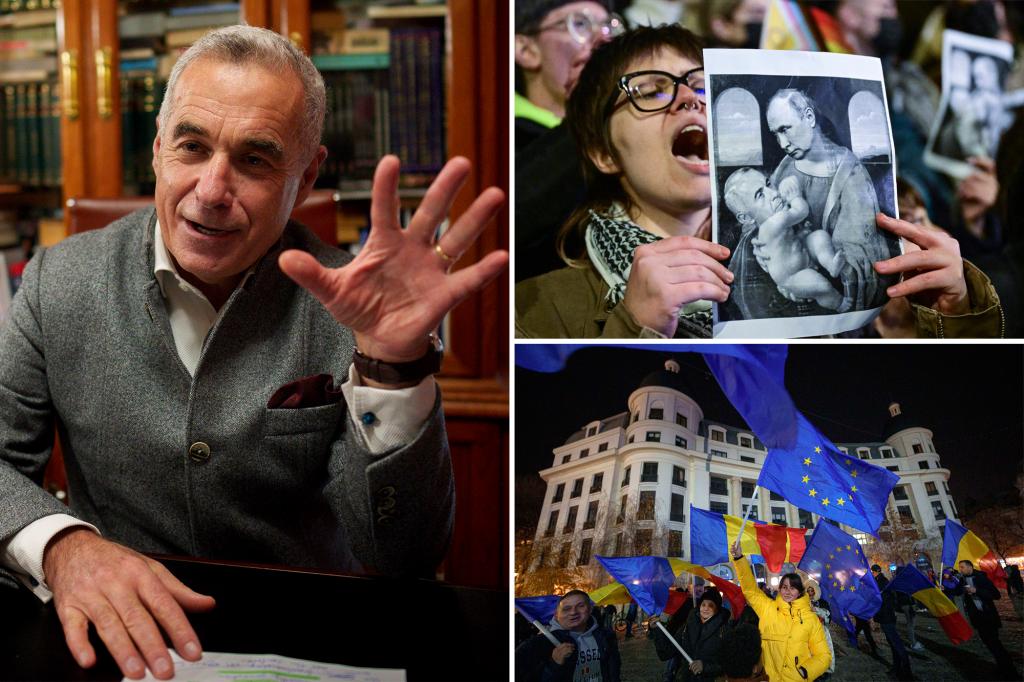The Romanian presidential election, initially held on November 24th and slated for a second round on December 3rd, has been dramatically annulled by the country’s Constitutional Court following revelations of alleged Russian interference. The unprecedented decision throws the nation’s political landscape into disarray and raises serious questions about the integrity of the democratic process. The court’s ruling, deemed binding and final, came after Romanian intelligence agencies declassified information revealing a sweeping social media campaign orchestrated by Russia to bolster the candidacy of the far-right outsider, Calin Georgescu. Georgescu, who unexpectedly emerged as the frontrunner in the first round, had previously made controversial statements downplaying the legitimacy of Ukraine and expressing a desire for amicable relations with all nations, irrespective of their geopolitical stances.
The annulment has sparked a wave of controversy and accusations of undermining the democratic will of the people. Elena Lasconi, Georgescu’s centrist rival who was poised to challenge him in the second round, vehemently denounced the court’s decision as “illegal, immoral, and a crushing blow to democracy.” Lasconi argued that the vote should have proceeded as planned, respecting the choices of the nearly 9 million Romanian citizens who cast their ballots. She expressed confidence in her ability to win and vowed to continue fighting for the Romanian people and upholding democratic principles. While acknowledging the seriousness of the Russian interference allegations, Lasconi maintained that such issues should be addressed after the election, emphasizing the importance of respecting the electoral process.
On the other hand, Prime Minister Marcel Ciolacu staunchly defended the annulment, characterizing it as “the only correct solution” given the compelling evidence of Russia’s attempts to manipulate the election outcome. Ciolacu called for a thorough investigation to identify and hold accountable those responsible for the alleged interference. The prime minister’s position underscores the gravity of the situation and the government’s commitment to safeguarding the integrity of the democratic process. The contrasting perspectives of Lasconi and Ciolacu highlight the deep divisions created by the annulment and the complex challenges facing Romanian democracy.
The Russian interference, according to Romanian intelligence, involved a sophisticated social media operation utilizing thousands of accounts across platforms like TikTok and Telegram to promote Georgescu. The campaign focused on rapidly boosting his popularity, employing tactics such as paying users to promote Georgescu’s content and disseminating pro-Georgescu messaging. One TikTok user alone allegedly spent over $381,000 to promote Georgescu’s campaign on the platform, raising suspicions about the source of these funds. This coordinated online push, coupled with Georgescu’s surprising surge in popularity despite minimal campaign spending, led authorities to suspect external manipulation. Furthermore, Romanian intelligence detected over 85,000 attempted cyber-attacks on election-related websites and IT systems, further reinforcing concerns about foreign interference intended to disrupt the electoral process. The sophistication and scale of these alleged operations underscore the seriousness of the threat to Romania’s democratic institutions.
The Romanian presidential election was already fraught with controversy prior to the annulment. The Constitutional Court had previously ordered a recount of the first-round votes, which it initially validated before the intelligence regarding Russian interference was disclosed. The court’s decision to annul the election marks an unprecedented intervention in Romanian politics and highlights the extraordinary circumstances surrounding this election cycle. The thirteen candidates vying for the presidency, the unexpected rise of Georgescu, the allegations of Russian interference, and the subsequent court rulings have created a highly volatile and uncertain political environment. The annulment underscores the fragility of democratic processes and the vulnerability of elections to manipulation, particularly in the digital age.
The implications of the annulment extend beyond the immediate political fallout. Romania, a NATO member, holds a strategically important position in Eastern Europe, and the outcome of its presidential election carries significant weight for regional stability and the broader geopolitical landscape. The alleged Russian interference raises concerns about Moscow’s attempts to exert influence in the region and undermine democratic processes. The president of Romania, who serves a five-year term, wields substantial power in areas such as national security, foreign policy, and judicial appointments. The outcome of the rescheduled election will therefore have a significant impact on Romania’s domestic and foreign policy trajectory. As the nation prepares to redo the first round of voting, the need to ensure a free and fair election, protected from foreign interference, is paramount. The international community will be closely monitoring the situation as Romania navigates this unprecedented political crisis and strives to uphold its democratic values in the face of external challenges.

